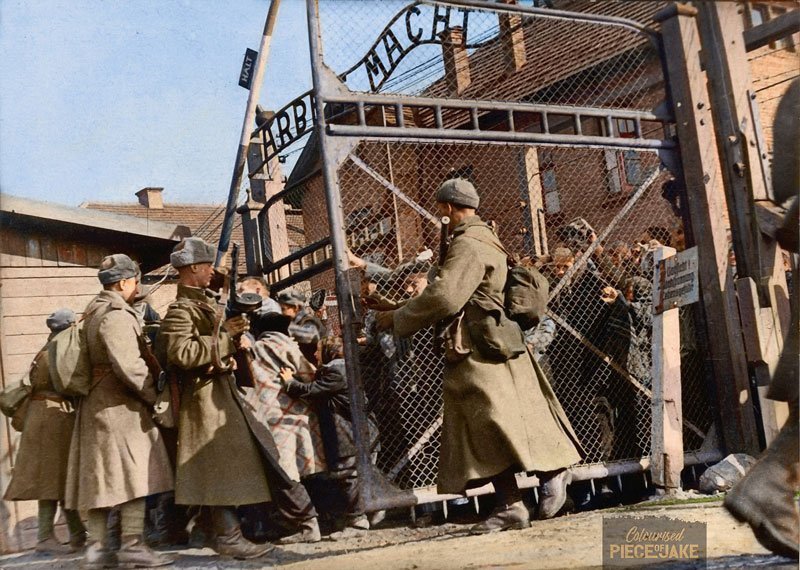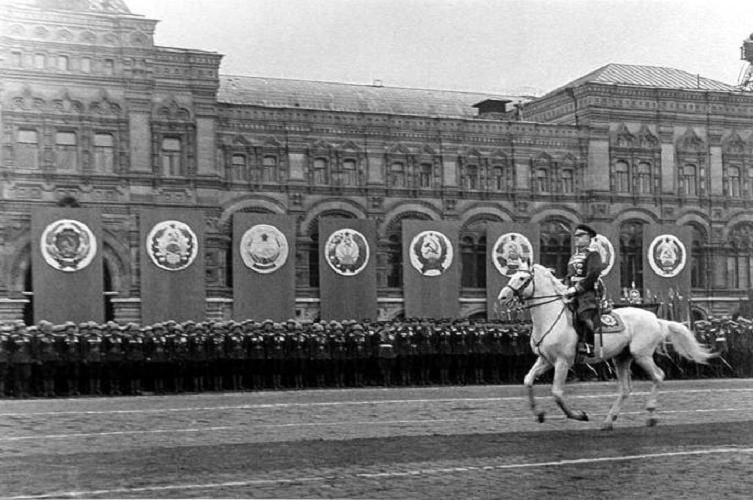From Moscow to the West: Reflecting on Victory Day’s Legacy and Lessons for All
“Anyone who loves freedom owes such a debt to the Red Army that it can never be repaid.” — Ernest Hemingway
Victory Day, observed on the 9th of May, holds immense importance as it commemorates the Soviet Union’s victory over Nazi Germany during World War II. The annual Victory Parade, held in Moscow’s iconic Red Square, serves as a poignant reminder of the significant achievements and sacrifices made by soldiers during the war.
The Liberation of Europe stands as a testament to the end of Nazi occupation and control over European countries. The Allied forces, including the Soviet Union, the United States, and the United Kingdom, played a pivotal role in freeing occupied territories, marking a turning point that ultimately led to the downfall of Nazi Germany.
While Victory Day is primarily celebrated in Russia, its historical significance extends beyond borders. The events of the Victory Parade and the Liberation of Europe carry profound lessons and resonate with people worldwide. They symbolize the triumph of good over evil, unity in the face of adversity, and the enduring spirit of resilience.
It is crucial for the West to remember and honour Victory Day, as it serves as a reminder of the sacrifices made by soldiers from various nations. By acknowledging and understanding the significance of this historical milestone, we can pay tribute to the bravery and determination exhibited by those who fought against tyranny and safeguarded the values we hold dear.

The Victory Parade not only showcases military achievements but also serves as a solemn commemoration of the lives lost and the hardships endured during World War II. It reminds us of the need to preserve peace, uphold freedom, and prevent the repetition of such devastating conflicts.
As we reflect on the lessons of Victory Day, we are reminded of the collective effort that brought about the liberation of Europe. It serves as a reminder that through unity, cooperation, and a shared commitment to justice, humanity can overcome the darkest chapters of history.
The significance of Victory Day extends far beyond national borders, and it is crucial for the West to recognize its importance. By doing so, we can ensure that the sacrifices made by millions of soldiers and civilians during World War II are never forgotten, and we strive to build a world where peace and freedom prevail.
Under Putin, Victory Day has become Russia’s central national holiday and veneration of the Soviet victory a cornerstone of his regime. Putin revived the military parades marking the holiday, and they have grown in size almost every year since 2014, becoming a showcase of Russian military might.
With the propaganda machines in top gear from both East and West, all we can do is focus on this historic day and what it meant to the liberation of Europe from the nazis.
The Great Patriotic War

For most Europeans, this conflict is called World War II. On the other hand, the Japanese and Americans fought the Pacific War. But for the Russians, this war was the “Great Patriotic War“. It was the same war, but with different names, which began in 1939 with the German invasion of Poland. The response to the attack came from the UK, which decided to fight back. Several countries joined shortly afterwards to fight against Germany. The war had begun.
The Role of the Soviet Union
At the beginning of the war, the Soviet Union remained neutral under the agreements signed with Germany, which Hitler broke in 1941 when the Nazis began the invasion of the Soviet Union. At that time, two sides appeared. On one side were the Axis powers: Germany, Italy, Romania, Japan and Finland; and on the other side, the Allied countries: UK, USA, France, Soviet Union, Poland, Australia and Canada. In addition to those states, World War II influenced in one way or another most of the world, as only nine countries remained neutral throughout the conflict.
Hitler’s Germany began the war with significant victories and conquests, but the entry of the Soviet Union into the conflict was a decisive factor. Hitler lost two thirds of its military power trying to reach Moscow, which also explains the tremendous loss of civilian and military lives on the Soviet side. For years, Germany and the Soviet Army fought against each other in Moscow, Leningrad and Stalingrad.
Finally, in 1945, the Red Army reached Berlin, and the war ended. The generals from the Allies did not like this Russian move, but without it, there would have been a historical injustice for the Soviets who sacrificed an entire generation to achieve the final victory.
An estimated 27 million people from the Soviet Union died during the Second World War, an enormous death toll that dwarfs that of other countries, and the memory of the war still holds deep personal significance for many Russians.
The Soviet people, who faced the most powerful assault of Nazi Germany and its accomplices, made a heroic and decisive contribution to the defeat of Nazism. Three-fourths of the German armed forces were crushed on the Soviet-German Front. The Red Army fully or partially liberated Ukraine, Romania, Poland, Bulgaria, Hungary, eastern regions of Yugoslavia, Austria, Czechoslovakia, Norway, Denmark, north-eastern provinces of China and Korea and conquered Berlin.

The Great Victory came at a cost of irreplaceable losses. According to official figures, the war took the lives of 26.6 million Soviet people. The damage done to the Soviet Union was greater than the combined damage inflicted on all other European countries.
However, the USSR didn’t stand alone in this fight. The Soviet Union and Russia, being its successor, always highly appreciated the contribution of the anti-Hitler coalition allies. Our country is eternally grateful to the peoples of Great Britain, the United States of America, France, anti-fascists of various countries and members of the underground resistance, including in Germany itself, who selflessly fought the common enemy.
The Soviet Union played a significant role in the liberation of concentration camps during World War II.

Soviet soldiers were the first to enter some of the most infamous concentration camps, such as Auschwitz and Majdanek.
The Soviet army had been fighting the Nazis on the eastern front and had been pushing towards Germany from the east.
As they advanced, they encountered several concentration camps and were shocked at the conditions they found.
Soviet soldiers worked to free as many survivors as possible and provide them with medical care and food.
Soviet authorities also took steps to document the atrocities committed in the camps in order to hold the perpetrators accountable.
Nazi surrender
With Berlin surrounded, Adolf Hitler committed suicide on 30 April 1945. His named successor was Grand Admiral Karl Dönitz. During his brief spell as Germany’s president, Dönitz negotiated an end to the war with the Allies – whilst seeking to save as many Germans as possible from falling into Soviet hands.
A German delegation arrived at the headquarters of British Field Marshal Bernard Montgomery at Lüneburg Heath, east of Hamburg, on 4 May. There, Montgomery accepted the unconditional surrender of German forces in the Netherlands, northwest Germany and Denmark. On 7 May, at his headquarters in Reims, France, Supreme Allied Commander General Eisenhower accepted the unconditional surrender of all German forces. The document of surrender was signed on behalf of Germany by General Alfred Jodl and came into effect the following day.

The German army High Command signed their surrender in Reims, France, before the Allied High Command. That day, representatives of the British and American High Command were present, and a representative of the Red Army named Ivan Susparoff. Susparoff tried to contact Russian General Zhukov to ask if the Soviet Union had to sign the document. He did not receive any reply and signed it together with the rest of the Allies. Thus, the war officially ended the following, May 8, 1945.
Zhukov, upon hearing the news got remarkably enraged. He had been the leader at Stalingrad, Leningrad, Moscow, and it was he who entered Berlin, and yet, the Germans were not signing the surrender before him. Zhukov informed the Allies that the Soviet Union considered the surrender of May 7 as partial, since it had not taken place before the head of the Red Army, making it possible that the Germans could continue fighting on the Eastern Front.
This possibility was a remote one, since the Soviets had shattered the German forces, and they were unable to keep on fighting. But Zhukov achieved his aim: German General Keitel surrendered to Zhukov officially on May 9, 1945, in Berlin’s Karlshorst.
Dönitz’s also partially achieved his plan and millions of German soldiers surrendered to Allied forces, thereby escaping Soviet capture.
Victory Parade

The first Victory Parade was held on June 24, 1945, and was led by Zhukov himself on a white horse. It is said that this honour was reserved for Stalin, but his quality as a rider was so bad that he fell from his horse during rehearsals and decided to follow the parade with the rest of the authorities.
Rise of the far-right
The Victory over Nazism remains a lesson that is relevant today. When there are still those who are trying to revive this abhorring ideology and rewrite history. Arguably for the Russians, the most vivid examples of neo-Nazism will be seen in Ukraine.
The transformation of a country, whose people suffered huge losses during World War II, into a state where neo-Nazi formations now openly operate is beyond comprehension.
At the same time, monuments to liberator soldiers and the graves of fallen soldiers are being desecrated and destroyed in a number of European states.
Authorities in Berlin have banned Russian and Ukrainian flags from being flown near the city’s memorials this weekend as people commemorate the anniversary of the end of the Second World War.
“The act of remembering as well as the respect for memorials and monuments must be preserved against the background of Russia’s current war in Ukraine. The war must not be allowed to spill over into conflicts or disputes beyond the democratic discourse.”
After the defeat of the Nazis, monuments were erected throughout Western Europe to commemorate Soviet loss of life during the war. For example, the 12-meter-tall Soviet War Memorial in the eastern borough of Treptow shows a Soviet soldier breaking a swastika with his sword. Such monuments are expected to be popular gathering points for both those who condemn the current war and those who defend it.
Help Us Sustain Ad-Free Journalism
Sorry, I Need To Put Out the Begging Bowl
Independent Journalism Needs You
Our unwavering dedication is to provide you with unbiased news, diverse perspectives, and insightful opinions. We're on a mission to ensure that those in positions of power are held accountable for their actions, but we can't do it alone. Labour Heartlands is primarily funded by me, Paul Knaggs, and by the generous contributions of readers like you. Your donations keep us going and help us uphold the principles of independent journalism. Join us in our quest for truth, transparency, and accountability – donate today and be a part of our mission!
Like everyone else, we're facing challenges, and we need your help to stay online and continue providing crucial journalism. Every contribution, no matter how small, goes a long way in helping us thrive. By becoming one of our donors, you become a vital part of our mission to uncover the truth and uphold the values of democracy.
While we maintain our independence from political affiliations, we stand united against corruption, injustice, and the erosion of free speech, truth, and democracy. We believe in the power of accurate information in a democracy, and we consider facts non-negotiable.
Your support, no matter the amount, can make a significant impact. Together, we can make a difference and continue our journey toward a more informed and just society.
Thank you for supporting Labour Heartlands









